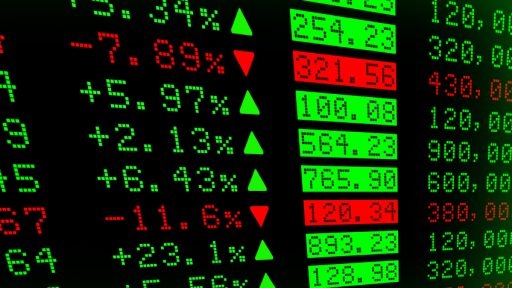- Home
- >
- Fundamental Analysis
- >
- Most important tips for playing the stock market from Jim Cramer

Most important tips for playing the stock market from Jim Cramer

As the Trump presidency forges on with executive orders, cabinet appointments and changes to various policies and agencies, this edition of TheStreet's Trading Strategies analyzes industries and asset classes that are likely to be affected in the month of March.
While markets have, for the most part, endorsed the Trump administration's pro-business, pro-America strategy, there are other signs that investors have overlooked or ignored some aspects of the new president's policies that may present risks to corporate interests.
So what do investors need to know to position their portfolios in March? We're focusing on that favorite safe-haven investment -- gold, as well as currencies, fixed-income and select equities. Not to mention a potential tax cut, or even a tax holiday, that could impact companies with huge overseas cash piles such as Action Alerts PLUS portfolio holdings Apple (AAPL) and Cisco (CSCO) as well as, Johnson & Johnson (JNJ) and Pfizer (PFE) , among others.
Jim Cramer, TheStreet's founder and manager of the Action Alerts PLUS portfolio, which owns Apple and Cisco, sat down with TheStreet's experts to discuss trading trends in March.
March could be a turbulent month for investors. Jim Cramer, TheStreet's founder and manager of the Action Alerts PLUS portfolio, sat down with the experts the wide ranging discussion touched on trading strategies for gold, equities, forex and fixed income.
Despite what bullish Wall Street investors seem to believe, sweeping tax reform isn't imminent -- although we might get more guidance soon on what GOP lawmakers have in store.
The Trump administration and legislators have sent mixed signals on the timing and substance of a tax-reform package. The president last month pledged a "phenomenal" proposal by early March, although U.S. Treasury Secretary Steve Mnuchin said August was more likely.
Beyond timing, there's no consensus among Republicans on what tax reform, which has already helped propel banks such as Bank of America (BAC) and JPMorgan (JPM) sky-high, will look like. Sen. Lindsey Graham (R-S.C.) said last month that proposal the House put forth wouldn't get 10 votes in the Senate.
Much remains up in the air in terms of what will get done -- and when -- on President Trump's tax-reform plan. Overall, my sources believe that what ultimately becomes law will be smaller than discussed and take longer to implement. Having said that, it's wise to prepare for possible changes so that you can manager your portfolio effectively.
TheStreet's Peter Tchir expects cuts to individual tax rates to become law in some way, shape or form, which will have the most immediate impact on municipal-bond funds and dividend-paying stocks. On a corporate level, Tchir believes proposed reforms to cash repatriation, interest deductibility and business depreciation will come as a package.
Action Alerts PLUS portfolio holdings Apple (AAPL) , Cisco (CSCO) and Alphabet (GOOGL) , as well as Microsoft (MSFT) , Johnson & Johnson (JNJ) and Oracle (ORCL) are just some of the companies that could benefit from a potential tax holiday, as they have huge hoards of cash overseas.
Virtually every U.S. business and investor has been looking for, hoping for and/or betting on a major tax-reform package under President Trump. What should equity investors do in this environment? We'll, you're going to have to defend yourself from headline-driven political risk to your portfolio.
You can find many such stocks in the Russell 2000, as small-cap names tend to pay about 33% effective tax rates vs. the roughly 28% that big-caps in the S&P 500 pay. (And of course, some big-caps like Action Alerts PLUS portfolio holding General Electric (GE) pay much, much less.)
Those who like to do their own hunting might want to move into regional banks. TheStreet's Stephen Guilfoyle has long liked KeyCorp ( KEY) , while another name known for its above-average effective tax rate is Bank of the Ozarks ( OZRK) .
Currency markets have overwhelmingly decided that a Trump tax cut will lead to U.S. dollar strength -- but I believe that it's too early to position for the best scenario, so I prefer to take the other side.
The overriding view in U.S. currency markets assumes that more money in corporate and consumer pockets will lead to greater spending, which in turn will stimulate the economy, pushing up stock and real estate prices in turn. Many think this will then fuel higher prices in general, which will prompt a hawkish Federal Reserve to raise interest rates.
Gold is already off to a good start in 2017, up some 8% so far to about $1,230 an ounce. Those strong gains follow a year where the metal also rose 8.5% during 2016 despite a poor fourth-quarter showing.
There are several reasons why I believe the commodity, which is mined by Barrick Gold (ABX) and Randgold Resources (GOLD) , among others, will move even higher both short- and long-term, but let's focus on the current consensus as to why gold is rallying -- inflation. Gold has long been used as a store of wealth and hedge against inflation and that trade seems to be back in vogue.
Jim Cramer asked Peter Tchir, a fixed-income expert on what he thought the Fed would do in March. Tchir remarked that the real risk is if the Fed does nothing. He also noted that, "we want to see a measured increase at the front end of the rate. That may push treasuries up a little bit but it'll be very controlled."
"The real risk is if the Fed does nothing," Tchir said., adding that the agency, which is headed by chairwoman Janet Yellen, should act soon.
TheStreet
 Varchev Traders
Varchev Traders Read more:
If you think, we can improve that section,
please comment. Your oppinion is imortant for us.











